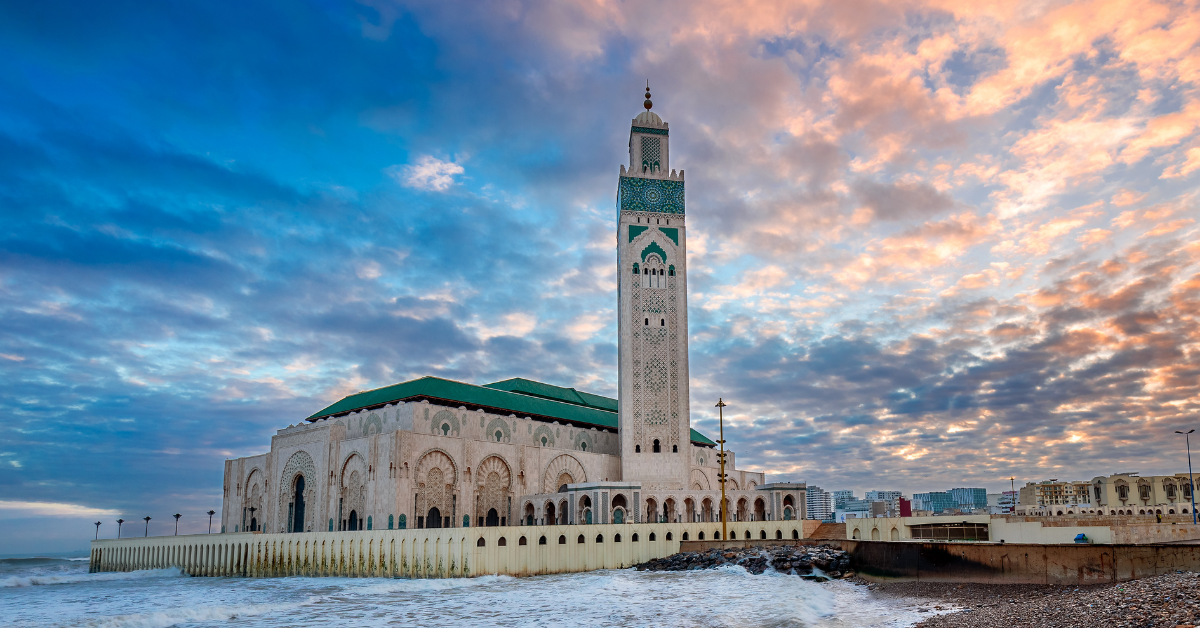Casablanca, the largest city in Morocco, is not only an economic hub but also a cultural symbol recognized worldwide. While the city’s name means “White House” in Portuguese, there is no official Kanji representation in Japanese. In China, it appears as “卡薩布蘭卡,” which is only a phonetic transcription. For Japanese people, Casablanca resonates with romance, elegance, and passion, shaped by films, flowers, and sports.
Origin of the Name Casablanca
The name Casablanca comes from Portuguese, meaning “White House.” During the Age of Exploration, sailors approaching the region from the sea would use the white stone buildings on the coast as landmarks. This reference later became the city’s official name.
In Japanese, it is written in Katakana as “カサブランカ,” with no Kanji form. The Chinese “卡薩布蘭卡” is simply a phonetic transcription and not meaningful characters.
| Language | Representation | Characteristics |
|---|---|---|
| Japanese | カサブランカ | Written only in Katakana, no Kanji |
| Portuguese | Casablanca | Means “White House” |
| Chinese | 卡薩布蘭卡 | Phonetic transcription, no meaning |
Thus, the way the city is written differs by language. Japanese people most commonly encounter the Katakana form or the Chinese phonetic representation.
Features of the Chinese Representation “卡薩布蘭卡”
In Chinese, foreign place names are often expressed using phonetic transcription. Casablanca follows this rule, represented as “卡薩布蘭卡.”
For instance:
- “卡” is pronounced ka
- “薩” is pronounced sa
- “布” is pronounced bu
- “蘭” is pronounced lan
- The final “卡” is ka again
This combination produces the sound “Casablanca.”
Examples of other phonetic Chinese transcriptions include:
| City (Japanese) | Chinese Representation | Pronunciation |
|---|---|---|
| New York | 紐約 | Niǔ Yuē |
| London | 倫敦 | Lún Dūn |
| Paris | 巴黎 | Bā Lí |
| Casablanca | 卡薩布蘭卡 | Kǎ Sà Bù Lán Kǎ |
These are chosen for their sound, not their meaning.
Cultural Image of Casablanca in Japan
Influence of the Film “Casablanca”
The 1942 film “Casablanca” is considered one of the greatest classics in world cinema. In Japan, it has been shown repeatedly, and its famous lines remain widely remembered. The city name evokes strong associations of “melancholy” and “romance.”
The story is set in wartime Casablanca, where refugees gather, and it depicts love and separation. For many Japanese people, the city name itself has become a symbol of bittersweet love.
The Lily “Casablanca” and Its Symbolism
Another major association is the lily variety called Casablanca. This large, white flower is extremely popular in Japan and is often used at weddings, funerals, and formal occasions.
| Flower Feature | Meaning | Use |
|---|---|---|
| Large white petals | Purity, nobility, elegance | Weddings, funerals, gifts |
| Strong fragrance | Cleanliness, presence | Venue decorations, bouquets |
This flower has reinforced the positive image of the name, tying the city to “elegance” and “refinement.” The shared name of the city and the flower has amplified the cultural association in Japan.
Casablanca as a Sports City
Casablanca is also the sports capital of Morocco, especially in football.
It is home to two powerhouse clubs, Wydad Casablanca and Raja Casablanca, both of which have achieved major success in African continental competitions. Their matches attract tens of thousands of fans, and on game days, the entire city is immersed in passion.
| Club | Achievements | Fan Base |
|---|---|---|
| Wydad Casablanca | Winners of the CAF Champions League | Supported widely by the working class |
| Raja Casablanca | Competed in FIFA Club World Cup | Popular with youth, famous for passionate fans |
The rivalry between the two is known as the “Casablanca Derby,” one of the most intense derbies in Africa.
In addition to football, Casablanca has produced Olympic-level athletes in athletics and boxing, further highlighting its role as a sports city. Japanese sports news sometimes features Casablanca through international competitions, reinforcing awareness of the city.
Casablanca as an Economic City
Casablanca is also the economic hub of Morocco. Historically a trading port, today it remains one of Africa’s leading financial centers.
| Field | Characteristics | International Role |
|---|---|---|
| Trade | Major Atlantic port, import-export hub | Gateway between Europe and Africa |
| Finance | Hosts multinational corporations | North Africa’s business center |
| Tourism | Islamic architecture and modern skyline | Popular with European travelers |
Thus, Casablanca combines economy, culture, and sports, making it a multidimensional city.
Conclusion
Casablanca originates from Portuguese, meaning “White House,” and in Japanese it is written in Katakana as “カサブランカ.” The Chinese “卡薩布蘭卡” is a phonetic transcription, not an official Kanji.
For Japanese people, Casablanca symbolizes multiple layers:
- From cinema, it evokes “romance and melancholy.”
- From flowers, it conveys “purity, nobility, and elegance.”
- From sports, it represents “passion and vitality.”
- From economics, it embodies “growth and international significance.”
Casablanca is therefore not just a place name. It is a city where culture, sports, and economy intersect, and for Japanese people, it resonates as a name of special meaning and charm.






